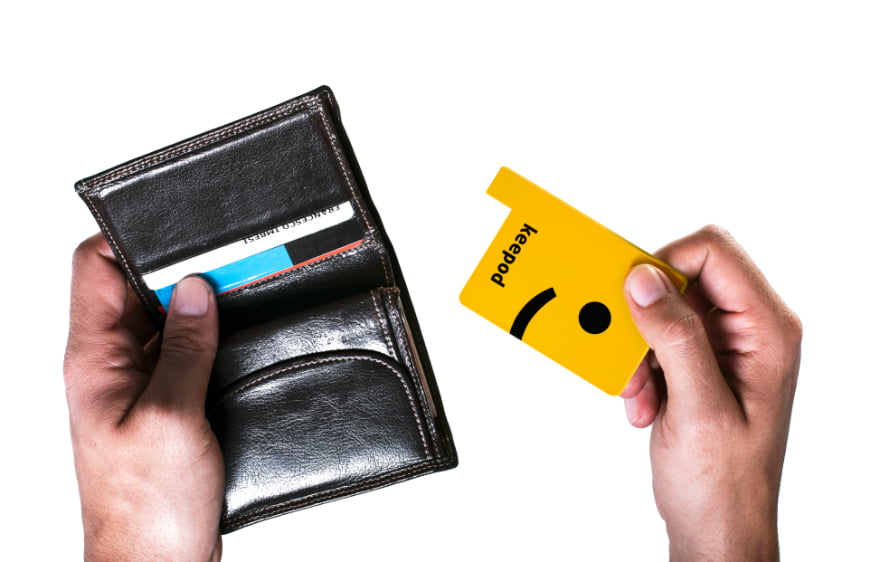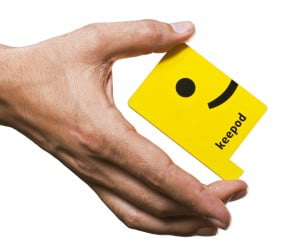Credit cards, key cards, identification cards, but what about computer cards? Wouldn’t it be great if you could carry all your computer information with you on a card that fits nicely into you wallet? And wouldn’t it be even greater if on top of computer information, this card could store all your digital information?
Israeli company Keepod calls the information stored on the aforementioned devices our “digital souls” and aims to store it all on one card – the Keepod. After launching in Italy, the company is now aiming for a new market – Israel, with the opening of their new branch in Bnei Brak.
With Keepod (Hebrew for hedgehog), we will no longer depend on a specific hardware, computer or port to access our personal data, says CEO Nissan Bahan. He tells NoCamels that his company wants to “separate the digital body from the digital soul.”
Related articles
So what is the Keepod? Essentially, it’s a small, yellow, friendly-looking card, just a tiny bit larger than a credit card, with a small USB connector at one end. It might not look very sturdy, but in a near future it might be the only thing we need to grab as we leave the house.
[youtuber vimeo=’http://vimeo.com/54496176′]
Take your desktop with you wherever you go
In development since early 2010, Keepod aims to unify and simplify the way we access our digital information and allows up to 16 GB of secure storage in a single card. NoCamels held an interview with managing director of Keepod Israel, David Chouraqui, in Bnei Brak, outside Tel Aviv. We connected simultaneously via webcam with Keepod’s founder and CEO in Milan, Nissan Bahar.
Keepod’s Managing Director, David Chouraqui pointed at the screen displaying Bahar’s face: “We are currently using Keepod on this computer.” There was, indeed, a Keepod plugged into the USB port. “If I took this Keepod out and plugged it into any other computer be it a Mac, a PC, even a wreck with burned-out hardware, it would open the exact same desktop layout.”
The trick is that a Keepod card carries its own operating system: Keepod OS. On the screen, where there would usually be a Windows or Apple logo on the taskbar, there was a spiky black hedgehog, Keepod’s icon.
Keepod works as a physical key through which you obtain access to your digital data, be it access to your bank balance or to open the door to your office. When plugged into a computer, it unlocks the personal part of a network’s information. In other words, it opens a desktop layout which exclusively contains your documents of an internal network (such as a company’s or a household with various computers). Once connected to the internet through the device’s integrated wired LAN connection, Wi-Fi or 3G cellular data connection, users can also store or download information using cloud technology.
It is strictly for individual use: one key accesses one desktop, allowing no interaction with the rest of the network. Therefore, there’s no danger of spreading virus or malware from your home computer to the rest of your office. What’s more, it makes it much harder to access your information after you leave a computer. “Companies can’t tap or watch your data in any way,” says Bahar. The only key to access that information will be safely tucked into your wallet.
Israel – a natural habitat for the Keepod
The decision to open a branch in Israel, Chouraqui explains, is due to the Israeli market’s highly competitive nature: “It’s very natural for the Israeli market to adapt a product like Keepod.”
Sign up for our free weekly newsletter
SubscribeRecent studies by Keepod have shown up to 70 percent reduction in Desktop TCO (Total Cost of Ownership) among Keepod users. “Keepod actually reduces the technology costs, increases security and replaces obsolete infrastructures,” Chouraqui claims. So far, Keepod Israel’s managing director is satisfied with Israel: “It’s a very demanding market but can be very rewarding when the technology is appreciated.”
One card to rule them all
Keepod’s multi-facetious technology allows it to store the most diverse types of data. Apart from the aforementioned OS, it also includes a smartcard (the small, square, golden chips common on most payment cards); hardware encryption of military caliber and, an NFC chip. So the Keepod can be used as a credit card, a public transport voucher and even to open the door to your office. On the screen, Nissan Bahar held up a Keepod in one hand and a smartphone in the other: “When I go to work, I only take these two things with me. The Keepod is the only card I have to carry in my wallet.”
Isn’t it dangerous, however, to carry all that information on just one single card? According to Chouraqui, the Keepod’s incorporated smartcard is designed to preventing that hazard. The encrypted data can only be accessed by inserting some personal credentials, like a password. But there’s more than that: should you lose your Keepod, you’d have to act just like when you lose your credit card. Only instead of contacting your bank, you’d have to urgently call your IT department. They would then remove your device from the network’s directory and redirect it to a new device. Your “soul” will be fully transported from one card to another.
A revolution in digital philosophy
Another question that might arise is whether we really need dozens of GB of hardware storage when we have cloud technology? Bahar explains that Keepod is simply a DNA copy of your desktop, meaning you can essentially walk around with your computer in your pocket.
Keepod is also pursuing more surprising markets. Every year, hundreds of thousands of computers are being thrown away from homes and offices in order to acquire the latest software and the latest hardware to run it. Keepod is currently working on a program that redirects these unwanted terminals to schools. By giving each teacher and student their own Keepod, they will be able to bring these “carcasses” back to life – even if the original OS is dead. The determent of hardware will no longer be an excuse for buying a new PC. Computers will be a tool to access your Keepod data. In Nissan Bahar’s words, “the PC will be an accessory of the Keepod.”
Keepod is also manufacturing hardware-empty screens and stations: cheap, convenient “empty shells” to be bought independently or alongside a Keepod card.
Keepod for the family and on the go
Keepod will be present at the World Expo 2015 in Milan with the “Keepod Experience,” an interactive display in which every participant will have a Keepod in his hands for interacting with different state services.
Keepod has only commercialized the enterprise version of the product. But Keepod plans to start seeping into our daily lives this year. The company is currently testing the private-use Bahar says Keepod would be ideal for families who share one or two computers: “For instance, every family member could have their own Keepod, increasing privacy and encouraging responsibility in children, but parents won’t have to bicker with their children over what programs they install or download onto a computer’s hard-drive.”
The next big hurdle for Keepod will be to unite its product with smartphones, so the next time NoCamels comes across Nissan Bahar, he’ll only need to lift one hand when showing which items he takes with him when leaving the house.
Photos courtesy of Keepod
Related posts

Editors’ & Readers’ Choice: 10 Favorite NoCamels Articles

Forward Facing: What Does The Future Hold For Israeli High-Tech?

Impact Innovation: Israeli Startups That Could Shape Our Future





Facebook comments